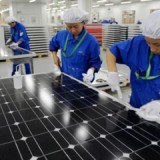The following is an excerpt from Will Dubitsky’s 3-part blog on FIPPA.
Canada is shooting itself in the foot with the China-Canada trade agreement – the Foreign Investment Promotion and Protection Act (FIPPA). Specifically, a little known stipulation in the China-Canada trade agreement risks torpedoing the development of Canadian clean energy technology sectors. This stipulation calls for no commercial barriers on environmental technologies. Why is this dangerous?
Well, with Canada’s clean tech sectors still very much in an embryonic stage, FIPPA, as it presently stands, would impose severe limitations on Canada’s potential participation in the phenomenal growth of global clean technology sectors, because of the massive and highly subsidized dumping of Chinese clean technologies on global markets.
More precisely, while the 1) US response to this dumping has been to impose trade tariffs, running from 31% to 250% on solar tech imports from China, along with tariffs of 45% to 71% on imports of Chinese wind turbine towers; and 2) the European Commission in June 2013 announced provisional tariffs on imports of Chinese solar products, ranging from 37.3% to 58.7%. Canada is the only country dumb enough to accept, via FIPPA, a guaranteed exemption for environmental technologies from commercial barriers.
In the US, the action taken by the US Dept. of Commerce in Fall 2012 followed 1) the bankruptcies of 4 US solar firms; 2) complaints filed by The Coalition for American Solar Manufacturing (CASM), representing 11,000 US workers and 150 US companies; and 3) complaints filed by the US Wind Tower Trade Coalition, representing 4 US wind tower manufacturers.
With 119,000 jobs in the US solar sector in 2012 – a 13.2% increase over 2011 – and 75,000 in the US wind sector in 2011, the US wanted to take swift action to address unfair trade practices affecting sectors experiencing solid growth in these difficult economic times.
In Europe, the European Commission (EC) took action on complaints from EU ProSun, a group representing 20 EU solar companies and the majority of European solar industrial capacity. In May 2013, the EC issued a “warning shot” by indicating it might open fair trade probes into Chinese mobile telecom equipment and in June 2013 the EC announced provisional tariffs on solar imports from China, stating that the dumping by China’s solar firms “caused thousands of Europeans to lose their jobs, and 60 European factory closures of which 30 were in Germany alone”.
For Europe, the job stakes are especially high in that its clean tech sectors represented 1.1 million jobs in 2011 – with 372,000 jobs in Germany alone. In effect, “illegal dumping” below the cost of production allowed China to capture more than 80% of the EU solar energy market “from virtually zero” only a few years ago.
Accordingly, beginning on June 6, 2013, the EC tariffs came into effect at a reduced rate of 11.8% for 2 months with the game plan being that, in the event of failed negotiations with China, the full provisional rate would be ramped up to an average of 47.6%, with the high end at 67.9% for the next 4 months. Subsequently, the EC would decide as to whether it would make the tariffs permanent.
In parallel, BSW, Germany’s solar trade association, is reviewing a trade case against China.
Notwithstanding Europe’s sabre rattling, it appears that the majority of European nations, Germany in particular, would prefer a negotiated settlement over trade wars.
China, for its part, initiated its counter-offensive, in July 2012, when it launched WTO anti-dumping and anti-subsidy investigations into allegedly unfair, low-priced US and South Korean polysilicon exports to China. Polysilicon is a key raw material for solar panels and 44% of the polysilicon used by Chinese solar manufacturers comes from the US.
Moreover, China registered a complaint with the WTO to the effect that $7.3B worth of Chinese renewable energy products have been subject to US tariffs in recent years, contrary to WTO rules. China also launched its own probe into subsidies of 4 US states and found they violate WTO rules.
The irony in all this is that, largely due to US polysilicon exports to China, the US had a $1.6B clean tech trade surplus with China in 2011. Specifically, when polysilicon, PV production machines and solar materials are factored in, the US held a $913M solar trade surplus over China in 2011.
Regarding China’s response to the EC’s June 2013 tariff initiatives, China’s polysilicon producers have called on Beijing to launch an anti-dumping investigation into European polysilicon imports, and urged Beijing to retaliate.
To add some colour to China’s sabre rattling, it has also indicated it would investigate the dumping of European wines in China. China did, however, acknowledge that Europe provided for a 2 month period of reduced tariffs.
Over the long run, however, Chinese manufacturers will likely to have an advantage in trade wars because of generous, cheap financing, lower production costs, scales of production which lower total costs, and an ability to refine silicon, make wafers and cells and build modules, as well as, or better than, any other group of manufacturers.

